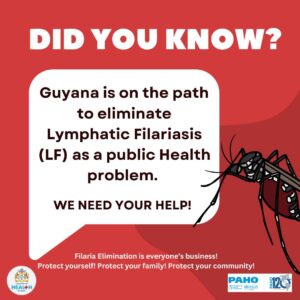Guyana Health Ministry warns about Lymphatic Filariasis (LF) as public health problem
The Ministry of Health of the Republic of Guyana has been working to eliminate Lymphatic Filariasis (LF).
24th of January 2023

Guyana: The Ministry of Health of the Republic of Guyana has been working to eliminate Lymphatic Filariasis (LF). The Ministry has outlined, “Guyana is on the path to eliminating Lymphatic Filariasis (LF) as a public health problem.”
The Health Ministry further claimed that it needs the help of the citizens and residents of the country to progressively eliminate the disease. While concluding the message, it stated, “Filaria Elimination is everyone’s business! Protect yourself! Protect your family! Protect your community!” The Ministry of Health has been working along with the Pan American Health Organisation (PAHO).

It has garnered praise from the people of the country for such initiatives, and some even showed interest in participating.
What is Lymphatic Filariasis?
Lymphatic filariasis, also called elephantiasis, is a neglected tropical disease caused by parasitic roundworms transmitted through a mosquito bite. It is one of the common parasitic diseases worldwide and is estimated to affect over 120 million people in more than 80 countries.
When an individual is bitten by an infected mosquito, the larvae of the parasitic worms are released into the bloodstream. The larvae then migrate to the lymphatic system and mature into adult worms, which can live up to 5 years. They block the lymphatic vessels and cause inflammation, leading to a fluid buildup in the body’s tissues. This leads to various symptoms, including swelling of the limbs, thickening of the skin, and hardening of the tissues.
The disease is particularly common in tropical and subtropical areas, where mosquitoes are more prevalent. People living in poverty and with bad lifestyles are particularly vulnerable to the disease due to overcrowding, poor living conditions, and limited access to healthcare.
To prevent and control the spread of lymphatic filariasis, it is important to limit contact with mosquitoes. This can be done by using insect repellents, wearing protective clothing, and using mosquito nets. In addition, health authorities can help limit the spread of the disease by providing regular treatment to at-risk populations. This treatment involves administering a combination of drugs, such as diethylcarbamazine, albendazole, and ivermectin.
Lymphatic filariasis can be debilitating, but it is also preventable and treatable. With the right interventions, it is possible to reduce the burden of this disease and improve the lives of those affected.
Latest
- Man injured in Belize City shooting, one detained
-
St Kitts and Nevis Government secures Frigate Bay lands for development and citizen ownership -
Saint Lucia Cruise Port to welcome thousands of tourists from February 16-22, boosting local economy -
St Kitts and Nevis to commission Basseterre Desalination Plant on February 24 -
West Indies Women to host Sri Lanka in Six-Match Series in Grenada
Related Articles

13th of December 2024

4th of December 2024

24th of November 2024

27th of November 2024

21st of November 2024

26th of November 2024

20th of November 2024

19th of November 2024
